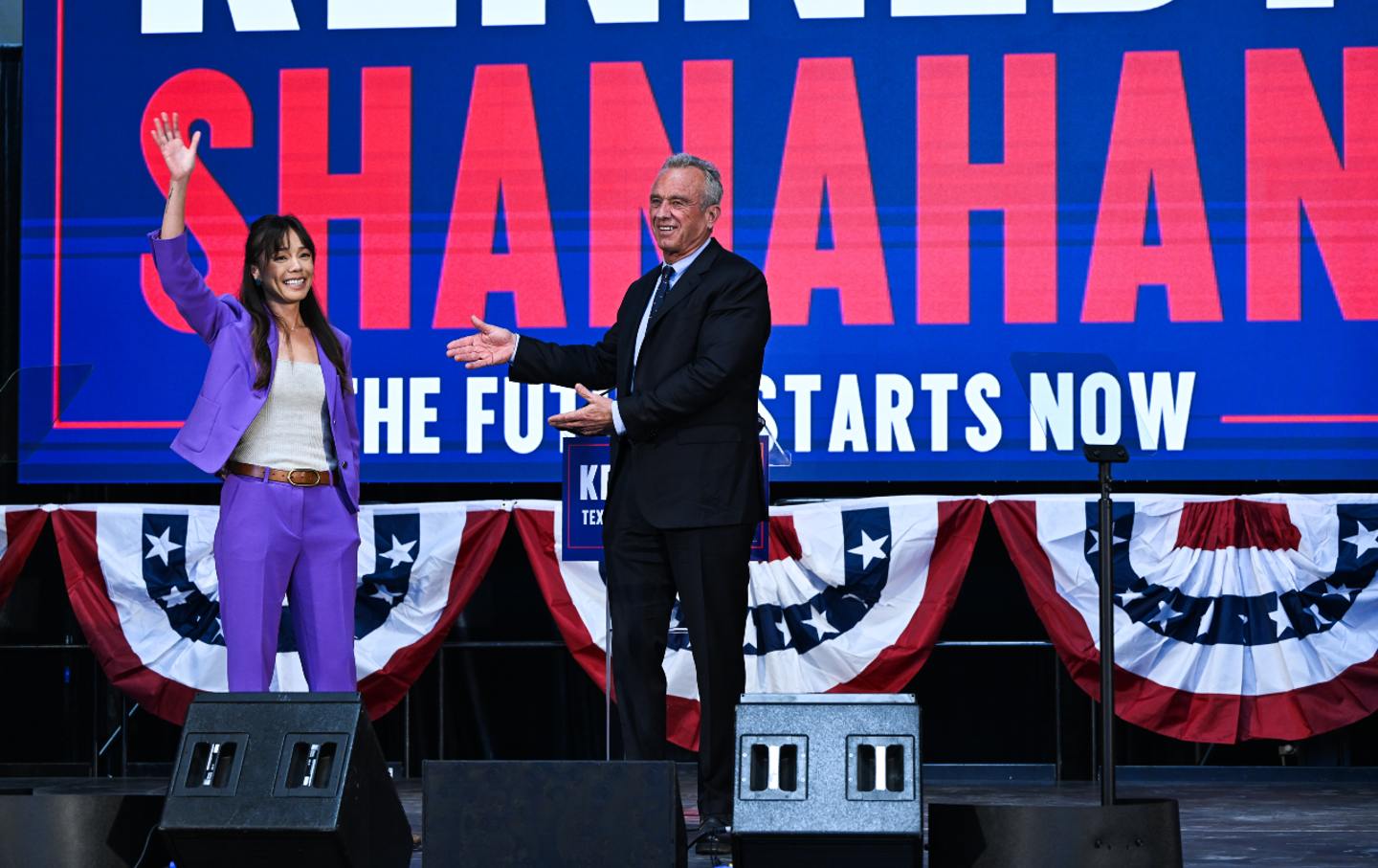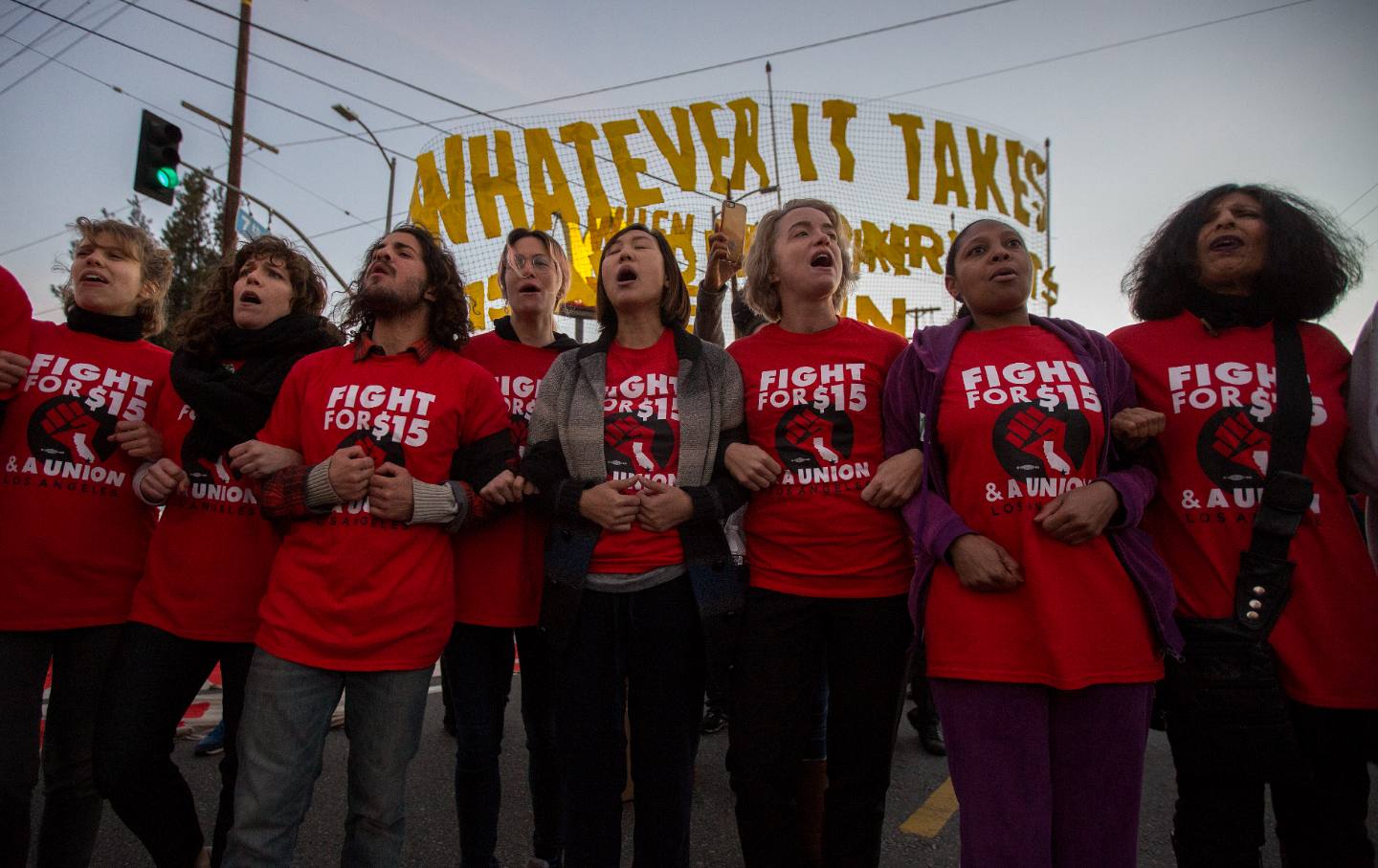Why Silicon Valley Reactionaries Love RFK Jr.
Kennedy’s newly picked running mate, Nicole Shanahan, reflects the necro-futurism of Big Tech.

Last Tuesday, Robert F. Kennedy Jr. announced that Nicole Shanahan, an ultra-wealthy lawyer with deep ties to Silicon Valley, would be his running mate in his independent bid for the presidency. In introducing Shanahan to his audience, Kennedy made a remarkable comparison between her and his notorious grandfather Joseph P. Kennedy. The Kennedy patriarch, who lived from 1888 to 1969 and whose vast wealth was the foundation for the legendary political family, is usually regarded as an embarrassment. He was notorious for his shady business practices and gangster connections, his sexual predation, and his ultra-right-wing politics, which, when he was US ambassador to Great Britain in the late 1930s, made him a leading ally of the British aristocratic appeasers who wanted to make a deal to allow Adolf Hitler to be overlord of Europe in order to preserve the British Empire.
Remarkably, Robert Kennedy freely acknowledged some of his grandfather’s flaws while comparing the patriarch to Shanahan. According to Kennedy, “In 1932 Franklin Roosevelt appointed my grandfather, Joseph Kennedy, to run his brand new Securities and Exchange Commission. My grandfather had been a stock manipulator on Wall Street and FDR wanted a chairman who understood the stock market inside and out as the only person who could reform it.”
The logic here seems to be, “It takes a crook to catch a crook.” Reminding the world of the crookedness of the paterfamilias makes a strange sense because Robert Kennedy is trying to square the circle of presenting himself as rebel against big business (including Big Tech) while choosing as his running mate the very avatar of Silicon Valley plutocracy.
In his speech Kennedy claimed his campaign is “a spoiler for the war machine. It’s a spoiler for Wall Street and Big Ag and Big Tech and Big Telecom and Big Pharma and the corporate-owned media and all the corrupt politicians and corporations.” Even without the Shanahan alliance, this claim seems dubious. Far from attacking the war machine, Kennedy, very much in keeping with his family’s dubious history, is as big a pro-Israel hawk as Joe Biden. Kennedy’s opposition to “Big Pharma” has nothing to do with bringing down drug prices and is just a dog whistle for his advocacy of anti-vaxxing conspiracy theories. As for Big Tech, Shanahan is not a Joseph Kennedy–style crook who will rein in the other crooks but a pure manifestation of the class interests of Silicon Valley tycoons.
Shanahan is a telling vice presidential pick because she illustrates how Kennedy’s quixotic and bizarre presidential run is deeply intertwined with a reactionary faction inside the world of Big Tech that has embraced the politics of necro-futurism. These Big Tech right-wingers have decided to co-opt boomer nostalgia for the Kennedy family to sell a new version of “make America great again” that emphasizes the supposed scientific wonders that will emerge from dismantling the regulatory state.
Shanahan’s Silicon Valley credentials are impeccable. From 2018 to 2022, she was married to Google cofounder Sergey Brin, and part of her wealth came from their divorce settlement. Politically, her trajectory as a putatively independent-minded Democrat who shifted to the right as a result of the rise of the activist left follows a familiar path common among the Silicon Valley right.
Silicon Valley money, often tied to people in the circle of Peter Thiel, has fueled Kennedy’s presidential run. As Axios reported last June, “Several of Silicon Valley’s noisiest tech moguls have begun to support the candidacy of Robert F. Kennedy Jr., the vocal anti-vax activist who’s challenging President Biden for the Democratic Party nomination.” These early backers included Elon Musk as well as venture capitalists Chamath Palihapitiya and David Sacks (a longtime business and ideological ally of Peter Thiel, a Paypal and Facebook tycoon who backed Donald Trump in 2016).
Writing about this cohort in The New Republic in 2022, Jacob Silverman noted that a pivotal movement that helped coalesce the group was the successful campaign to recall Chesa Boudin as San Francisco district attorney because of his support for criminal justice reform. Both Shanahan and Sacks contributed heavily to the Boudin recall campaign, which demonstrated that Silicon Valley money could roll back left-wing social movements.
Prior to 2022, Shanahan was a typical wealthy Democratic Party donor, giving to figures such as Pete Buttigieg and Joe Biden. But in 2022 she joined the anti-Boudin campaign, which connected her with a wider cohort of reactionary tech figures. As Shanahan explained, she didn’t think that criminal justice reform was necessary and “Chesa came into a situation that needed to be maintained, in my opinion, not necessarily reformed.”
There’s a pipeline that runs from anti-Boudin sentiment to supporting Robert Kennedy, but law-and-order politics is just one component of Shanahan’s journey. Another key factor was openness to alternative medicine and quack science, defended with the familiar contrarian defense that we need to ask questions. Shanahan is opposed to in vitro fertilization as “one of the biggest lies that’s being told about women’s health today.” As AP reports, “Shanahan’s speech accompanying the announcement of her joining the Kennedy campaign “referenced discredited theories about vaccines as Kennedy and his allies have been accused of doing.”
In defining the sensibility of the group, Silverman noted:
Steeped in the inflammatory milieus of social media and Tucker Carlson demagoguery, Sacks and his fellow travelers often seem less to stand for anything than against the status quo—against criminal legal reform; against the public presence of homelessness; against a tradition of Democratic urban governance that, by indulging in identity politics, has failed to solve economic and social ills. They are angry, and they want the government, which they see as simultaneously incapable of doing much good, to work for them again.
Silverman’s last point about Silicon Valley magnates wanting the government “to work for them again” is key. Like many rich people, the Silicon Valley reactionaries feel thwarted by the existing regulatory state. Kennedy has cagily and disingenuously combined traditional populist rhetoric (that regulatory agencies have been corrupted by subservience to corporate power) with an alliance with corporate bosses for whom regulatory subservience is a goal.
Part of what makes this contradictory stance possible is the mythos of the Kennedy family as simultaneously outsiders and insiders, as the rich family whose wealth allows them to shake up the status quo—as the crooks who can catch the other crooks.
Support for deregulation is a major Kennedy legacy. As Garry Wills noted in his classic study The Kennedy Imprisonment (1982), the Kennedy family had defined their politics as a rebellion of charismatic leaders against a stifling bureaucratic rigidity. According to Wills, both John F. Kennedy and Robert F. Kennedy had “opposed ‘the system’ of lawmaking and bureaucratic administration as narrow and obstructive.” One of Senator Ted Kennedy’s major legacies was midwifing the deregulation of airlines and trucking.
Animating the Silicon Valley reactionaries is a necro-futurism—a belief that only by going backward into the dead past can America recover the vitality of the original Kennedy era when charismatic leaders pushed the country to embrace ambitious high-tech goals, like the mission to land humans on the moon.
This was the political vision Thiel evoked in 2016 at the Republican convention when he said:
It’s hard to remember this, but our government was once high tech, too. When I moved to Cleveland, defense research was laying the foundations for the internet. The Apollo program was just about to put a man on the moon–and it was Neil Armstrong, from right here in Ohio. The future felt limitless.
But today our government is broken. Our nuclear bases still use floppy disks. Our newest fighter jets can’t even fly in the rain. And it would be kind to say the government’s software works poorly, because much of the time it doesn’t even work at all. That is a staggering decline for the country that completed the Manhattan project. We don’t accept such incompetence in Silicon Valley, and we must not accept it from our government.
Popular
“swipe left below to view more authors”Swipe →Thiel believed at the time that Donald Trump could be the avatar for a renewed Kennedyism—made, like the original, in the USA. Reality soon intruded, and Thiel now freely acknowledges Trump’s incompetence. According to Thiel, the Trump administration “couldn’t get the most basic pieces of the government to work.”
But if Trump wasn’t JFK redux, perhaps JFK’s actual nephew could be? That is the logic that has led many in Thiel’s circle to support Kennedy’s campaign.
The fact that this political movement is galvanized by pure, unthinking nostalgia can be seen in the campaign ad that Shanahan helped pay for that ran during this year’s Superbowl. That ad was essentially a remake of an actual 1960 JFK ad, with Robert Kennedy’s face plastered over his uncle’s visage. The Kennedy family was understandably upset at Robert’s appropriation of his uncle’s legacy.
Robert Kennedy’s relationship with the legacy of the Kennedy family is complex. There are genuine ways in which he is in fact in line with what his ancestors have done. But JFK, RFK, and Teddy Kennedy—even as they deployed personal charisma against the bureaucratic state—were disciplined by belonging to a majoritarian political party. Because they were Democrats, they had to attend, against their preferences, to the arguments of actual social movements, including the civil rights movement, the anti-war movement and feminism. Robert Kennedy bears the same family name, but unlike his uncles is not restrained by party loyalty. His only loyalty and check are the Silicon Valley plutocrats funding his campaign. More than any Kennedy before, he has no allegiance except to his economic class. Which means he has all the bad elements of the Kennedy legacy—and none of the good.
More from The Nation

Democrats Are Overdue for New Leadership Democrats Are Overdue for New Leadership
To mount an opposition under the coming Trump administration, the party needs new ideas—not the same establishment clinging to power.

Why Democrats Are Losing Americans Without a College Degree—and How to Win Them Back Why Democrats Are Losing Americans Without a College Degree—and How to Win Them Back
Voters intuitively know that the economy has not worked well for most of us for decades. Democrats must offer them a transformative vision, and stick to it for as long as it takes...






